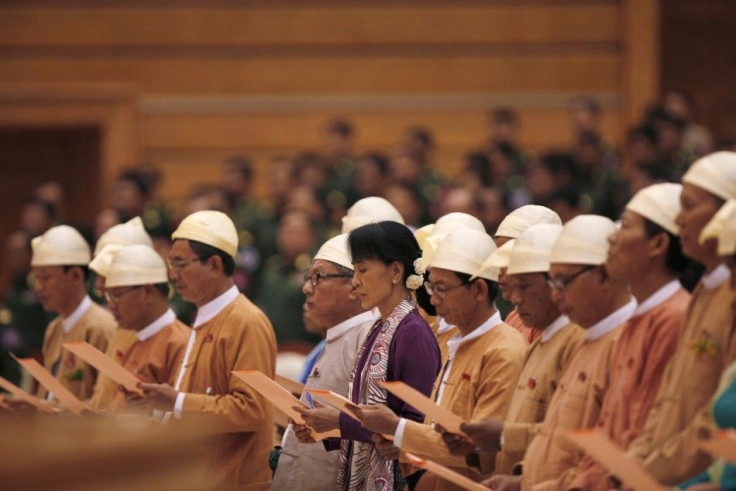As Suu Kyi Enters Parliament, Clinton Cautiously Optimistic About Myanmar's New Direction

Aung San Suu Kyi, leader of Myanmar's pro-democracy opposition and National League for Democracy (NLD), was sworn into Parliament on Wednesday after spending the last twenty years under house arrest for her opposition to military rule.
She initially refused to take the official oath into parliament because she objected to some of the wording of an oath -- specifically the part that requires her to pledge to safeguard the army-created constitution. She instead wanted the words to be changed to protect.
Suu Kyi backed down on Monday, however, and agreed to recite the oath as is. She explained that the reason we accept (the oath), firstly is the desire of the people. Our voters voted for us because they want to see us in parliament, the BBC reported.
Now, as an official member of parliament, she hopes to continue her struggle for democracy from within the government system.
According to the BBC, Suu Kyi told reporters after being sworn in that she and her fellow NLD lawmakers plan to carry out our duties within the parliament as we have been carrying out our duties outside the parliament for the last 20 or so years.
This is the first time Myanmar has had a formal opposition in parliament despite the fact the Suu Kyi has been leading the opposition struggle for over two decades, much of that time under house arrest. Suu Kyi was elected to parliament in a landslide victory for her party in by-elections held last month that international observers determined were free and fair.
United Nations Secretary-General Ban Ki Moon highlighted on Wednesday during his three day visit to Myanmar, the important role Suu Kyi may now play from her seat in parliament: I, like everybody in the world, fully admire her leadership and commitment, during the last two or three decades for peace and development and human rights for this country, for this region, and for the world. She has been a symbol of our hope for human rights for all, all around the world.
He also added: I am sure that [Suu Kyi] will play a very constructive and active role as a parliamentarian for the betterment and well-being of this great country.
She also accepted his invitation to visit the UN headquarters in New York.
Historic Transition and Cautious Optimism
Ban acknowledged that Myanmar, also known as Burma, has now made its first real steps towards democracy, and the international community should do all it can to aid in that transition.
The Myanmar people and government have embarked on a path of reform, democratization, and fuller participatory democracy, he said.
They deserve our support.
U.S. Secretary of State Hillary Clinton also praised Suu Kyi's election.
Clinton said in an official statement, I would like to send my congratulations to these pro-democracy leaders, other newly elected Members of Parliament, and the hundreds of thousands of voters for their courage and commitment to achieving a more representative and responsive government.
This is an important moment for Burma's future. A genuine transition toward multi-party democracy leading to general elections in 2015 will help build a more prosperous society, she added.
I encourage all political parties, civil society representatives and ethnic minority leaders to work together to address challenges and seize new opportunities for a more democratic, free, peaceful and prosperous future.
Although Clinton expressed the U.S.'s cautious optimism, she also recognizes that while Myanmar is now poised for change with the election of Suu Kyi and her NDL, the road to democracy is a long and difficult one as she focuses more on 2015.
As such, the U.S. has chosen not to lift all of its economic sanctions on Myanmar. Washington wants to keep up the pressure on the Burmese military and government to end human rights abuses and ensure a free and fair election in 2015.
Suu Kyi herself also acknowledged the need to maintain such pressure. Despite the fact that her party won 44 of the 45 vacant seats it contested in the lower house of the 664-seat Myanmar parliament, it remains a minority. Fully one-quarter of the seats are still reserved for unelected military officials. Suu Kyi hopes to change that -- and also hopes to enact many other reforms from her new position.
Although much of the world is certain that her historic election has important implications on Myanmar's future, when asked by Reuters whether she agreed, she shared Clinton's cautious optimism and modestly answered, I think only time will tell.
© Copyright IBTimes 2024. All rights reserved.











